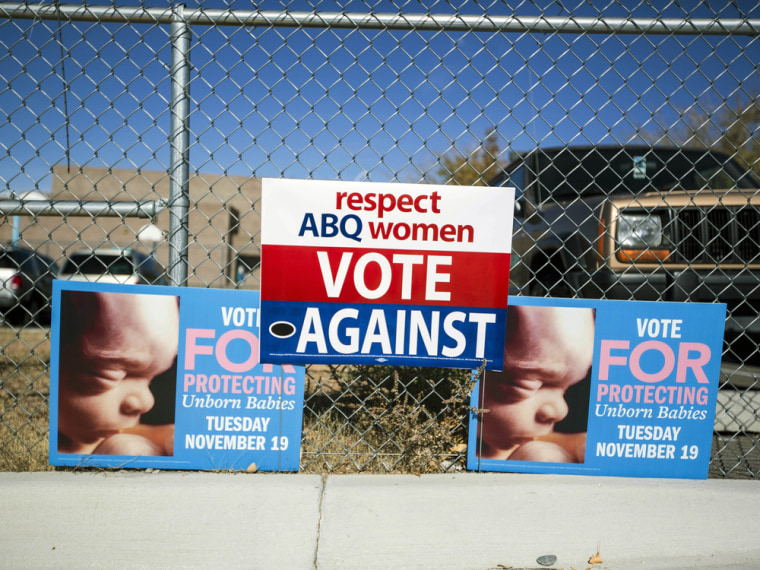The defeat earlier this week in Albuquerque, N.M., of a measure to outlaw late-term abortions hasn't discouraged abortion opponents from their latest strategy: micro-targeting cities and towns.
"We learned a lot from this campaign. It was a first, a trailblazing effort," said Cheryl Sullenger, a senior policy adviser at Operation Rescue, a pro-life Christian organization. "Next time, we're going to come back just a little smarter with a little bit more more experience."
Tuesday's vote would have enacted a citywide ban on abortions after 20 weeks, unless a mother's life was in danger, and was rejected 55 percent to 45 percent. The provision for New Mexico's largest and mostly Democratic city was the first test of an abortion measure being voted on at the municipal level, as opposed to the state or federal level.
"The anti-choice extremists felt like they had found a new tactic by going to the citywide level," said Ilyse Hogue, president of NARAL Pro-Choice America.
"There were more voters than there were in the mayoral race in Albuquerque," she said. "We saw an enormous amount of passion to uphold women's freedoms to make our own health care decisions with our doctors, and we hope it sends a message nationally that this is a right that most Americans agree women should have."
Despite the defeat at the polls, anti-abortion advocates are undeterred.
"It is a new strategy and it is one that I think we're going to see more of," Sullenger said. "We fell short here but if we had won it would have been pretty off-the-charts exceptional."
"Sometimes on the way to full victory, you have to do one campaign, one crusade, one battle at a time," said Alveda King, director of African-American outreach at Priests for Life, a religious organization that opposes abortion and euthanasia. "I'm not discouraged."
And calls from abortion opponents who want to get similar bans on the ballot in their own cities have been streaming in from across the country, said Tara Shaver, chairperson of ABQ Voters for Late Term Abortion Ban, which helped get the measure on the ballot.
"People are wanting to take the initiative in passing pro-life laws. It's not this concerted effort from a national perspective; what it is is grassroots, citizens coming up with the idea themselves," said Anna Higgins, director of the Center for Human Dignity at the Christian organization Family Research Council.
Shaver said she was disappointed by the defeat, but still felt determined to get late-term abortions banned in Albuquerque.
"We were really hoping to energize the rest of the nation with a win in a blue state and a blue city," she said. "Pro-life individuals are always looking for a new way to provide a measure of protection for moms and their babies."
The campaign cost hundreds of thousands of dollars in advertising and prompted national groups to descend on Albuquerque, knocking on doors and setting up tables to educate voters. Anti-abortion advocates said they were outspent 4-to-1 by pro-abortion groups.
A record number of city voters cast early ballots in the special election, Reuters reported.
Albuquerque was a clear choice as a place for abortion foes to launch their hyperlocal approach because it is home to two of the few clinics in the region that perform late-term abortions: the Southwestern Women's Options clinic and the University of New Mexico Center for Reproductive Health.
Where they'll try the strategy next is unclear.
"It's actually a little early for that. We just got off a pretty intensive campaign here," Sullenger said. "That's something we'll be discussing in the coming weeks. We need to stop and regroup and discuss the whole thing."
Liberal cities are likely to be their next stop, she said.
"What this ordinance was designed to do was bypass a road block [by the state legislature]. We're going to be looking at other states that are not exactly going to be friendly to us, but that's the whole point," she said. "In real conservative areas, there may not be a need for this kind of thing."
The Albuquerque initiative was largely focused around controversial research that indicates a fetus may feel pain starting at 20 weeks of gestation.
The measure didn't include exemptions for victims of rape or incest. The ban could have been lifted only to save a mother's life or if continuing her pregnancy ran the risk of "substantial and irreversible physical impairment of a major bodily function" to the mother.
Abortion rights advocates felt the lack of exemptions in the ban worked in their favor.
"The extremism of the folks proposing this ban came through," said Talcott Camp, deputy director of the ACLU Reproductive Freedom Project. "Voters in Albuquerque listened to the voices of women and their doctors. We had a lot of medical spokespeople talking about the importance of women and families having all of their medical options available for them to decide what's best for their family."
Added Eric Ferrero, vice president of communications for the Planned Parenthood Action Fund: "This election proves that when we have a real conversation about these issues, we win. When voters have a chance to really look at and think about what some of these extreme bans would actually do, they reject them."
